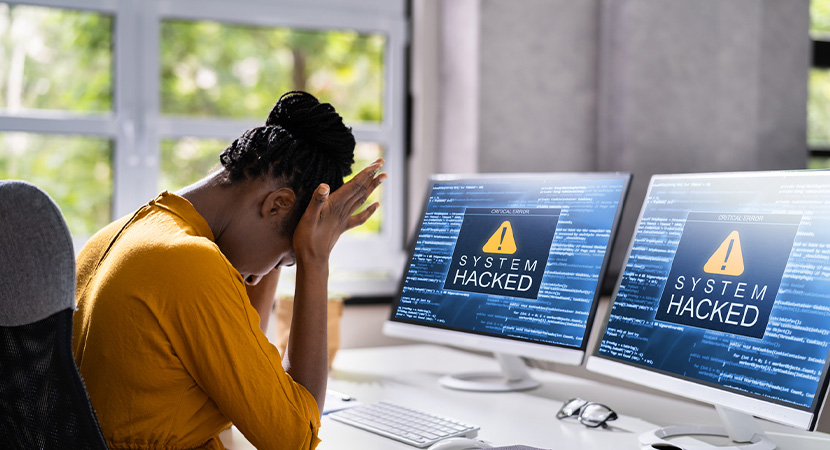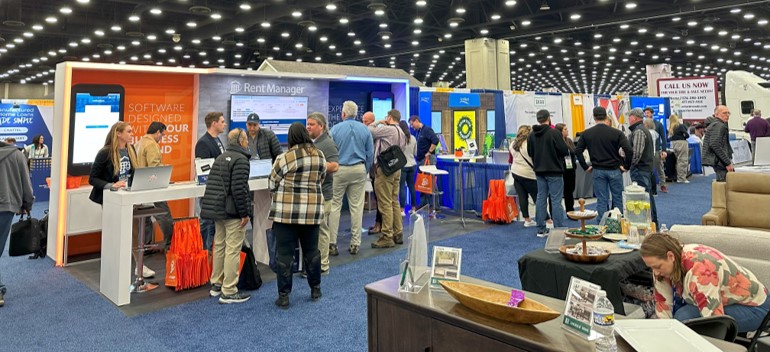As Benjamin Franklin famously said, “an ounce of prevention is worth a pound of cure.” With the world becoming more virtual each day, the risk of cyberattacks—malicious and deliberate attempts to breach information systems—continues to increase. Cyberattacks not only result in a loss of data, but they may lead to financial losses as well. According to a 2022 study conducted by UpCity, only 50 percent of U.S. small businesses have a cybersecurity plan in place. With more of your staff working remotely and the amount of personal information you collect from residents steadily increasing, you need a plan to protect your valuable data. Since October is Cybersecurity Awareness Month, it’s the perfect time to review the types of cyberattacks that can occur, risks involved, ways to prevent breaches, and solutions offered by LCS IT Services.
Common Cyberattacks
Here are some of the most common cyberattacks you need to know about:
Malware
If you have ever received a suspicious email encouraging you to click on a link or download a file, it could’ve contained malware. Malware or ‘malicious software’ is a type of program or file that can disrupt or damage your computer system. It can give hackers full access and control. Malware comes in the form of viruses, bugs, worms, bots, and spyware—just to name a few.
Ransomware
Ransomware is a form of malware designed to block access to your computer or data until a ransom is paid. Once the desired amount is paid to the hacker, access is restored. However, in some cases, even if ransom is provided, access to data still may be denied. This issue is such a concern that the U.S. government created an online resource—StopRansomware.gov. This website shares guidance for avoiding and combating ransomware attacks.
Phishing
With so many people relying on email and text messages to stay connected, phishing scams have increased in popularity. Phishing occurs when scammers contact you and solicit personal information via emails or text messages that appear to be from well-known and trusted sources. Information gathered is then used to hack into your existing accounts or open completely new accounts.
Phishing scams are effective because they appear to be coming from reputable organizations. The Federal Trade Commission (FTC) takes these attacks very seriously and has complied a catalog of helpful tips to recognize phishing activity.
Man-In-The-Middle (MITM)
Having a stranger open your personal mail is a very intrusive feeling. A MITM attack can feel similar—only worse. In this type of cyberattack, a hacker intercepts an existing conversation or data transfer. Typically, this occurs when someone is attempting to access a website or service. During the communication or transfer of information, the attacker pretends to be one of the participants in the exchange. This allows the hacker to retrieve confidential data—such as credit card numbers or login credentials—from either participant, while sending malicious links or false information to them. Unfortunately, most people don’t realize what’s happening during a MITM attack until it is too late.
Risks Involved for Property Managers
Data Breaches
If personal data or intellectual property in your system inadvertently reaches someone with ill intent, a simple mistake can result in a loss of valuable data that negatively impacts your business and your residents.
Disrupts Daily Operations
Cyberattacks disrupt daily routines and workflows. An attack on your computer network also has the potential to lower tenant satisfaction rates, reduce staff productivity, and negatively impact your revenue stream.
Damages Reputation
If there’s a perception that your operation’s data is not safe and secure, it will reduce confidence and trust in your property, affecting retention amongst residents and investors.
Ways to Prevent These Cyberattacks
While cyberattacks can be a nightmare for those who experience them, there are several ways to prevent cyberattacks and shield yourself from these scenarios:
Virtual Private Network (VPN)
Connecting to any public Wi-Fi network can be a risky—it only takes one hacker logging into the same network for your data to be breached. VPN is software that works as a shield to protect your online presence by encrypting data and routing it through a secure network. The benefits of a VPN include enhanced security for personal and professional data, and greater data access flexibility which is especially important given the ever-growing population of remote staff.
Encryption
Encryption protects data by encoding any digitally collected and stored information. The process consists of translating data from plaintext (unencrypted) to ciphertext (encrypted). Only authorized users with access to a cryptographic key can read it.
Multi-Factor Authentication (MFA)
MFA has become a data-security standard for many companies and institutions, and with good reason. MFA is a multi-step approach to securing data that requires two or more credentials to log into an account. This could entail an alert being sent to a smartphone or a secondary email address after you’ve entered your password to unlock a device or log into a website. This extra step provides one more layer of defense between your accounts and hackers trying to access your information. Available in Rent Manager, you can enable MFA via Systems Preferences > General Options > General.
Antivirus Software
While you’re mostly likely aware of the main function of antivirus software, did you know that it works to remove malware as well? Antivirus programs protect your computer by scanning for viruses and malware that can come from email attachments or software downloads. If a threat is detected, the software will warn you and attempt to eliminate the threat. Keep in mind that you may need to safeguard multiple devices, so look for antivirus software that offers multiple-platform protection.
Password Best Practices
The best, most secure passwords are those that you will actually remember. However, they should be unique enough that they cannot be easily guessed. Avoid common passwords like family names, pets, birthdays, or other information that can be found through a search of your social media profiles, etc. Complex passwords should contain at least 10 characters and use a combination of numbers, symbols, and capital and lowercase letters. The general rule is that you should create a unique password for each account you log into.
Using LCS Solutions to Prevent Cyberattacks
In addition to providing guidance for cyberattack prevention, LCS IT Services delivers a variety of solutions to protect your systems. Services include email security options that filter suspicious emails, monitor your inbox 24/7, and allow the sending and receipt of encrypted messages to further protect information from malicious threats.
Enhanced virus defense can also protect your business from potential risks by killing the process involved in a cyberattack, quarantining affected files, and even rolling back the affected system to before the attack took place. Furthermore, LCS IT Services offers cybersecurity preparedness training and monitoring for your entire organization with simulated phishing attacks, web protection to block suspicious websites, and MFA to keep access to your networks, workstations, and accounts secure.
Now that you’ve received “an ounce of prevention,” continue to stay up to date on cybersecurity best practices. It will give you the peace of mind you need to focus on your business.
 Register for RMUC.25
Register for RMUC.25





